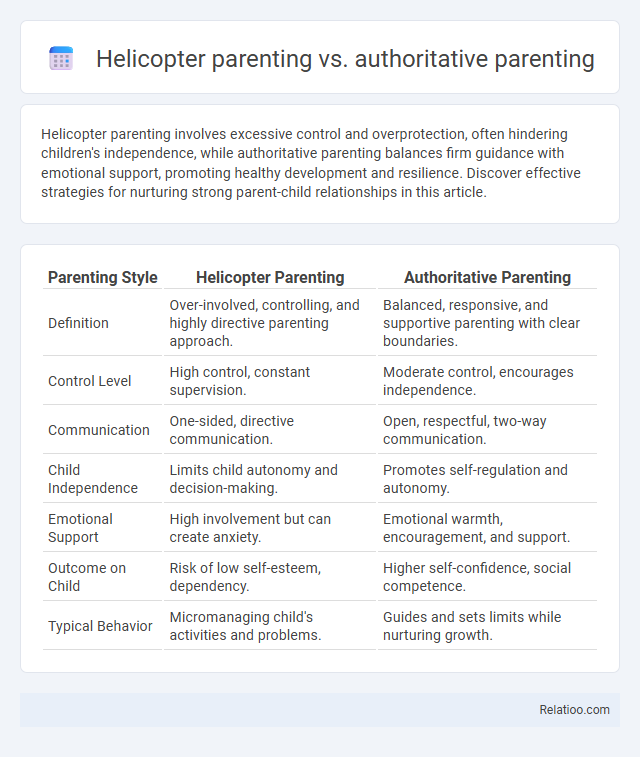Helicopter parenting involves excessive control and overprotection, often hindering children's independence, while authoritative parenting balances firm guidance with emotional support, promoting healthy development and resilience. Discover effective strategies for nurturing strong parent-child relationships in this article.
Table of Comparison
| Parenting Style | Helicopter Parenting | Authoritative Parenting |
|---|---|---|
| Definition | Over-involved, controlling, and highly directive parenting approach. | Balanced, responsive, and supportive parenting with clear boundaries. |
| Control Level | High control, constant supervision. | Moderate control, encourages independence. |
| Communication | One-sided, directive communication. | Open, respectful, two-way communication. |
| Child Independence | Limits child autonomy and decision-making. | Promotes self-regulation and autonomy. |
| Emotional Support | High involvement but can create anxiety. | Emotional warmth, encouragement, and support. |
| Outcome on Child | Risk of low self-esteem, dependency. | Higher self-confidence, social competence. |
| Typical Behavior | Micromanaging child's activities and problems. | Guides and sets limits while nurturing growth. |
Understanding Helicopter Parenting
Helicopter parenting involves excessive oversight and control of a child's experiences, often leading to reduced independence and increased anxiety. Authoritative parenting balances high responsiveness with clear boundaries, promoting autonomy and social competence. Understanding helicopter parenting highlights its tendency to inhibit self-regulation and problem-solving skills compared to the supportive, structured environment fostered by authoritative parenting.
Defining Authoritative Parenting
Authoritative parenting is characterized by high responsiveness and high demands, balancing clear rules with emotional support and open communication, fostering independence and self-regulation in children. Unlike helicopter parenting, which involves excessive control and over-involvement, authoritative parents encourage autonomy while maintaining consistent boundaries. This parenting style is linked to positive child outcomes such as higher academic achievement, better social skills, and greater psychological well-being.
Key Differences Between the Two Styles
Helicopter parenting involves excessive control and over-involvement in a child's life, often hindering autonomy and problem-solving skills, while authoritative parenting balances nurturing with clear boundaries, promoting independence and self-discipline. Unlike helicopter parents, authoritative parents encourage open communication and support decision-making, fostering emotional resilience. The key differences lie in the degree of control, responsiveness, and the impact on child development, with authoritative parenting linked to positive social and academic outcomes, in contrast to the negative effects often associated with helicopter parenting.
Psychological Impact on Children
Helicopter parenting often leads to increased anxiety and reduced independence in children due to constant supervision and lack of decision-making opportunities. Authoritative parenting, characterized by high responsiveness and clear boundaries, promotes psychological resilience, self-esteem, and social competence. In contrast, neglectful parenting is linked to emotional insecurity, poor academic performance, and higher risks of behavioral problems.
Academic Outcomes and Performance
Authoritative parenting, characterized by high responsiveness and clear expectations, consistently correlates with superior academic outcomes and performance, fostering independence and motivation in students. In contrast, helicopter parenting involves excessive control and intervention, which often leads to decreased academic self-efficacy and increased anxiety, negatively impacting student achievement. Balancing support and autonomy, authoritative parenting promotes optimal cognitive development and sustained academic success, whereas authoritarian or overly controlling approaches can hinder critical thinking and long-term educational attainment.
Social Skills Development
Helicopter parenting often hinders social skills development by limiting children's opportunities to navigate conflicts and build independence, resulting in less confidence in social settings. Authoritative parenting, characterized by balanced nurturance and clear boundaries, fosters strong social competence, emotional regulation, and the ability to form healthy relationships. Your child's social skills are more likely to flourish under authoritative parenting, which encourages autonomy while providing support, unlike the overcontrolling nature of helicopter parenting.
Emotional Resilience and Independence
Authoritative parenting fosters emotional resilience and independence by balancing clear expectations and supportive guidance, encouraging children to develop problem-solving skills and self-regulation. Helicopter parenting tends to undermine independence and emotional resilience by over-involvement and excessive control, limiting opportunities for children to learn from challenges. Permissive parenting often hinders the development of emotional resilience as inconsistent boundaries fail to prepare children for real-world stress and responsibility.
Long-Term Effects into Adulthood
Helicopter parenting often leads to increased anxiety and dependency in adulthood, limiting the development of autonomy and problem-solving skills, whereas authoritative parenting fosters emotional resilience, self-regulation, and social competence. Research indicates authoritative parenting contributes to higher academic achievement, better mental health, and stronger interpersonal relationships over the long term. Conversely, both helicopter and authoritarian parenting styles are linked to poorer adjustment outcomes, including lower self-esteem and difficulties in independent decision-making later in life.
Expert Opinions and Research Findings
Expert opinions highlight that authoritative parenting fosters independence and self-regulation in children, promoting higher academic achievement and emotional well-being. Research findings reveal helicopter parenting often leads to increased anxiety and decreased problem-solving skills due to overprotectiveness and control. Your understanding of these styles can guide you toward balanced parenting that supports healthy child development.
Choosing the Best Approach for Your Family
Helicopter parenting often involves excessive control and monitoring, which can hinder a child's independence, while authoritative parenting balances clear boundaries with emotional support, promoting autonomy and healthy development. Choosing the best approach depends on your family's values, your child's temperament, and the desired outcomes for their social and emotional growth. Emphasizing authoritative parenting practices typically fosters resilience, self-regulation, and confidence, making it a preferred strategy for many parents seeking long-term positive effects.

Infographic: Helicopter parenting vs Authoritative parenting
 relatioo.com
relatioo.com